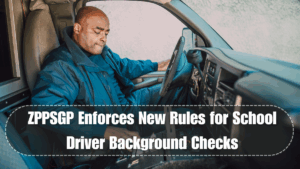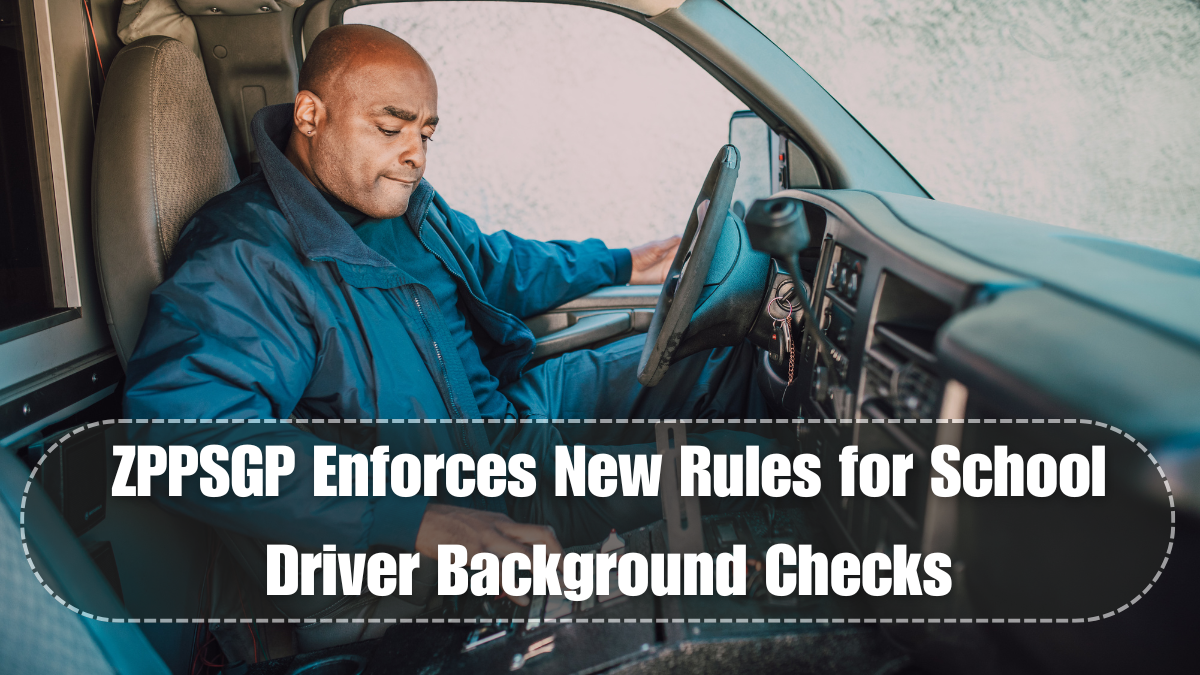In a bold move to improve the safety and accountability of school transportation, the Zilla Parishad Primary School Governing Program (ZPPSGP) has officially rolled out a school driver verification rules policy that mandates strict background checks for all school vehicle drivers operating within its jurisdiction. This new driver check policy has been introduced as a legal requirement starting October 2025 and applies to both government-employed drivers and those hired under contract by private school van operators.
The decision was made in response to growing concerns around student security, unregulated hiring practices, and the increasing number of transport-related incidents involving minors in rural and semi-urban areas. With this policy now in effect, ZPPSGP hopes to create a standardized protocol that ensures only certified, trained, and background-verified drivers are permitted to operate any school transport vehicle.
This is part of a larger commitment toward improving school transport infrastructure while safeguarding the emotional and physical well-being of young students.

What the new driver check policy includes
Under the new school driver verification rules, no individual will be allowed to drive a school bus, van, or auto-rickshaw without clearing a comprehensive vetting process. This includes verification of criminal records, medical health status, driving experience, and compliance with child safety conduct norms.
Here is a breakdown of the requirements:
-
Mandatory Police Clearance Certificate (PCC): Each driver must submit a PCC issued in the past 6 months.
-
Medical Fitness Certificate: Drivers must undergo annual medical tests for vision, hearing, and reflexes.
-
RTO Driving History: Past traffic violations or license suspensions must be disclosed and reviewed.
-
No-Minor Contact Rule Violations: Any past involvement in child harassment or abuse disqualifies the candidate.
-
Minimum Driving Experience: At least 5 years of experience in passenger transport is now a compulsory benchmark.
Moreover, school authorities are expected to maintain updated digital records of all employed or contracted drivers. A violation of the school driver verification rules will attract fines of up to ₹25,000 for first-time offenders and cancellation of vehicle registration for repeated non-compliance.
Why this policy was necessary
While the need for school transport is universal, rural and semi-urban areas in India often lack structured systems to vet those operating these vehicles. Many drivers are hired on a word-of-mouth basis with no formal checks or identity proof verification.
Some of the recurring safety risks reported over the past five years include:
-
Unauthorized drivers operating school vehicles
-
Drivers with criminal records or history of substance abuse
-
Lack of emergency training and response preparedness
-
Frequent use of overloaded and unsafe vehicles
The driver check policy now directly addresses these concerns by placing legal responsibility on schools, local government officials, and private transport contractors. For parents, this initiative is a welcome step toward rebuilding trust in school transportation.
Implementation strategy by ZPPSGP
ZPPSGP has set up a multi-phase rollout of the school driver verification rules, beginning with district-level awareness and training workshops. As part of the plan:
-
Nodal officers are appointed in each district to collect and verify driver documents.
-
School inspection teams will conduct surprise audits to check compliance.
-
Local RTO offices have been directed to prioritize school driver verifications.
-
Parent-Teacher Associations (PTAs) are being asked to actively monitor and report any violations.
To make the system transparent, the verified driver list will be made accessible on the ZPPSGP transport portal, where parents can look up the name, photo, and vehicle details of their child’s assigned driver.
Safety-first mindset: Changing how schools hire drivers
This new rule goes beyond paperwork—it is a shift in mindset. Schools can no longer view transport drivers as informal helpers. Instead, they are being asked to treat them as critical service providers who must meet the same standards of care and professionalism as teaching or administrative staff.
Key benefits of the school driver verification rules include:
-
Prevention of child-related crimes in transport environments
-
Fewer accidents due to improved driving qualifications
-
Faster response during medical or vehicle emergencies
-
Peace of mind for parents, especially in remote locations
This policy has already started showing positive change. Over 70% of school clusters in Maharashtra have completed the first round of driver checks as of October 15, 2025. Within weeks of implementation, several unauthorized drivers were replaced, and several private van operators were fined for attempting to evade the process.
FAQs
What is the new driver check policy?
It is a mandatory regulation under ZPPSGP requiring all school vehicle drivers to undergo criminal background, medical, and driving history checks.
Does this apply to private school vans?
Yes, all private and government school drivers operating under ZPPSGP jurisdiction must comply.
What happens if a school ignores this rule?
Non-compliance can result in fines up to ₹25,000 and cancellation of transport licenses or contracts.
Can parents access driver information?
Yes, verified driver details will be published on the ZPPSGP school transport portal for transparency.
Who verifies the documents?
Nodal officers and school transport inspection teams are responsible for verification and enforcement.
Conclusion
The introduction of school driver verification rules by ZPPSGP is a landmark in prioritizing student safety through systemic reform. With strong enforcement mechanisms and public accountability, this driver check policy is not just a response to past lapses—it’s a proactive step toward a safer, smarter future in school transport. By setting high standards and making compliance non-negotiable, ZPPSGP is showing how local education systems can lead from the front in child protection and public trust.
Click here to know more.
